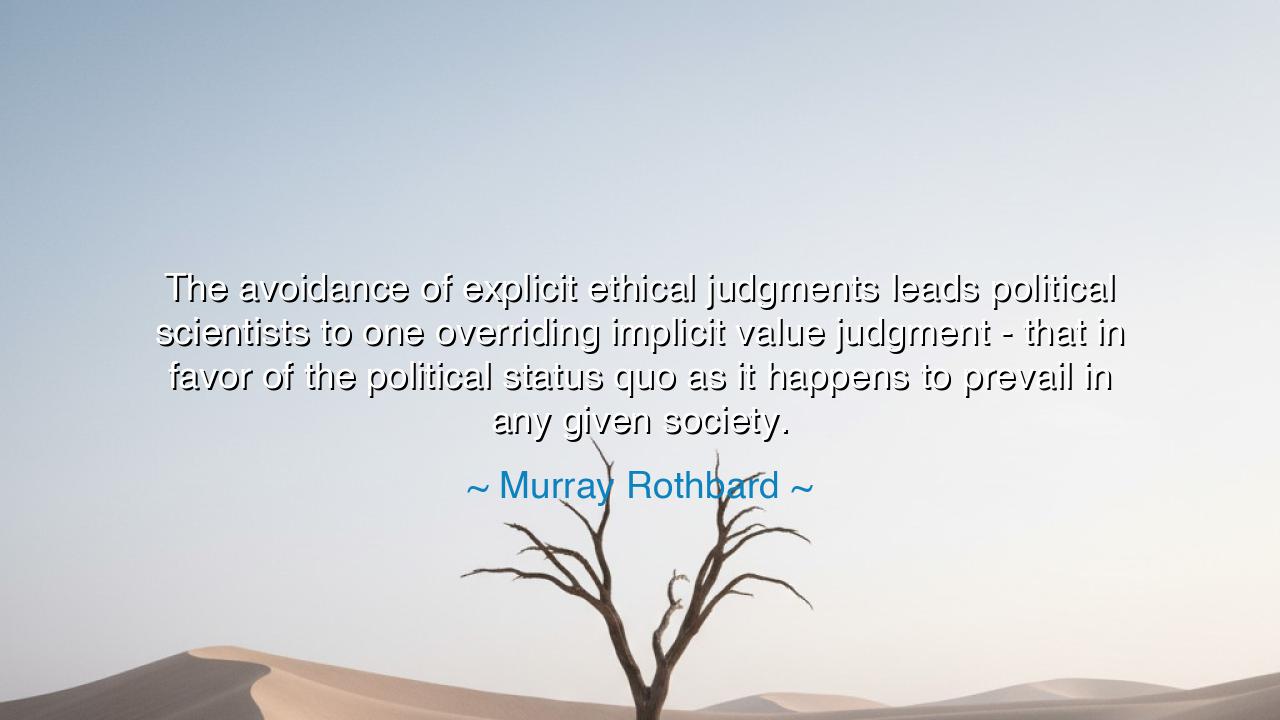
The avoidance of explicit ethical judgments leads political
The avoidance of explicit ethical judgments leads political scientists to one overriding implicit value judgment - that in favor of the political status quo as it happens to prevail in any given society.






The words of Murray Rothbard—“The avoidance of explicit ethical judgments leads political scientists to one overriding implicit value judgment - that in favor of the political status quo as it happens to prevail in any given society.”—sound like a thunderclap against complacency. In them, he warns us of a subtle danger: that when those who study and comment on politics refuse to speak openly of right and wrong, they are not being neutral, but are in fact upholding the existing order, however unjust it may be. For to withhold moral judgment is itself a judgment, and it is one that bends in favor of the powerful, the entrenched, the victors of history.
The ancients knew that neutrality in the face of injustice is not virtue, but cowardice. When Socrates spoke truth to Athens, he did not claim neutrality; he judged the city’s corruption and paid with his life. When prophets of old rebuked kings, they did not measure power in cold detachment; they declared what was righteous and what was wicked. Rothbard echoes their spirit when he insists that to stand apart from ethical judgments is to silently sanctify the status quo. It is as though one were to stand before chains and say nothing, thus blessing the chains by default.
History gives us many examples of this grim truth. Consider the scholars of Germany in the 1930s, many of whom claimed to be merely “analyzing” the political situation, carefully avoiding ethical judgments. Their silence became complicity, and their “neutrality” strengthened the Nazi regime. On the other hand, those who dared to make explicit ethical judgments—Dietrich Bonhoeffer, for example—became voices of resistance. Bonhoeffer declared that it was not enough to bandage the victims beneath the wheel of oppression; one must thrust a spoke into the wheel itself. His courage illustrates Rothbard’s point: only those willing to judge explicitly can challenge the tyranny of the status quo.
Rothbard’s words were born of his broader critique of political science and state power. He saw that too many intellectuals, wishing to appear “scientific” and “objective,” stripped morality from their analysis, speaking only in terms of systems, processes, and behaviors. Yet in so doing, they abandoned the most vital question: not just how politics works, but whether it is just. And when that question is silenced, the prevailing order—however corrupt, however exploitative—receives the blessing of legitimacy. The silence of scholars becomes the music of tyranny.
This teaching carries with it both warning and responsibility. The warning is that if we, too, avoid ethical judgments in our own age, we risk becoming defenders of the very injustices we despise. To say “this is simply the way things are” is to enshrine oppression. The responsibility is that we must speak with courage, even when our judgments are unpopular, even when they cut against the grain of society. For truth without morality is hollow, and knowledge without justice is dangerous.
The lesson for us is clear: we must not fear ethical clarity. In the face of corruption, call it corruption. In the face of cruelty, call it cruelty. Do not hide behind the mask of neutrality, for neutrality strengthens only the throne of the oppressor. Each of us, in our own measure, is called to speak with honesty about what is right, even when silence is easier. For silence is not neutrality—it is consent.
Practically, this means rejecting the temptation to disengage or to view injustice with the cool detachment of an observer. It means asking not only, “What is happening?” but also, “Is it just?” and “What must I do?” It means teaching the young to recognize that their voice carries moral weight, and that to avoid judgment in times of crisis is to render judgment in favor of the oppressor. And it means holding leaders, scholars, and ourselves accountable for the standards of justice we claim to uphold.
Thus, Rothbard’s words endure as a commandment for all ages: “The avoidance of explicit ethical judgments” is itself a moral choice, and it is a choice for the status quo. Take this teaching to heart. Do not surrender to the illusion of neutrality. Instead, stand firm, speak boldly, and let your judgments be guided by truth and justice. For only in the light of explicit moral clarity can society move beyond its chains and toward the freedom that belongs to all.






AAdministratorAdministrator
Welcome, honored guests. Please leave a comment, we will respond soon